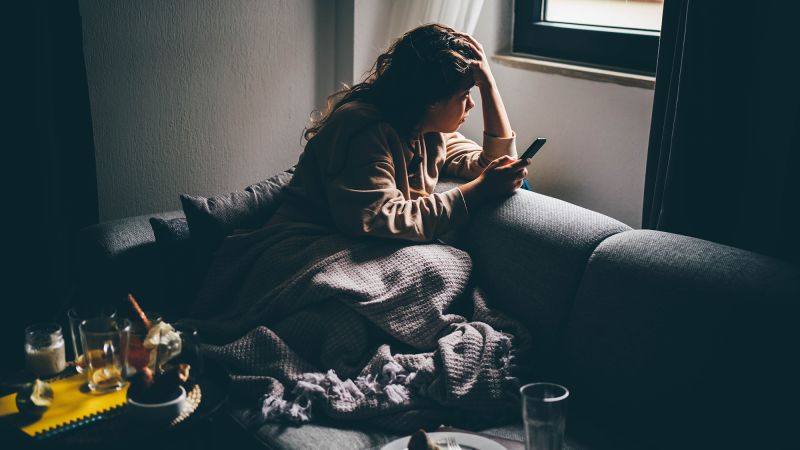
Editor’s note: Kara Alaimo is an associate professor of communication at Fairleigh Dickinson University. Her book “Over the Influence: Why Social Media Is Toxic for Women and Girls — And How We Can Take It Back” was published in 2024 by Alcove Press. Follow her on Instagram, Facebook and Bluesky.
What do modern social media users have in common with American soldiers who decided not to return to the United States after being held as prisoners of war in North Korea? More than you might think, according to one professor. We’re all potential victims of mind control, according to Rebecca Lemov, a historian of science at Harvard University and author of the new book “ The Instability of Truth: Brainwashing, Mind Control, and Hyper-Persuasion .” The American soldiers were brainwashed into not wanting to go home through tactics including isolation, the fraying of social bonds and sleep deprivation, Lemov said.

And she argues that the same things happen to many users of social apps, and it’s awful for their mental health. After decades of studying brainwashing in situations including POWs, cults and torture, she’s concluded that “this is something to which we’re all susceptible, and that we consistently underestimate our malleability.” But while social networks may manipulate our emotions, we can take steps to protect ourselves by drawing on lessons from her research.
Ask yourself how social media affects you Social media affects users differently, Lemov noted, comparing it to some people’s experiences in cults. “What’s a cult for one person may not necessarily have the same effect on someone else,” she noted. When one person who is recruited decides to go all in, another “may get certain things out of it, but not decide to give over their life savings or things like that.
” She said social media is the same way. It affects different people differently, perhaps partly because of past experiences. That’s why, when we consume content online, it’s wise to pay attention to how we’re feeling.
“Social media really puts you in your head a lot,” she said. “It’s almost as if you’re an entity without a body.” What to do about it: Lemov pays attention to her own reactions by meditating every day, which gives her a way to tune in to sensations in her body and how they change.
If a particular type of content leaves someone feeling anxious or upset, that’s a helpful signal to consume less of it and even block those who create that kind of online work. Social media can manipulate us It’s not just how different kinds of social media influence our emotions. Lemov said social networks may actively manipulate us.
In 2014, Facebook revealed it had conducted an experiment without users’ knowledge showing it could influence their moods. The platform showed some users more positive content and others more negative content, then examined the emotions those users conveyed in their later posts. Those shown more positive posts seemed happier, and those who saw more negative posts seemed less happy.
“It was almost like a proud announcement (by Facebook executives that they) have the capability to ...
tune emotions as if we had a volume control,” Lemov said, noting that the social network received a lot of backlash after its announcement. Pick an IRL social life over social media Spending time on social media can isolate people, and unlike with prisoners of war, it’s ostensibly by choice. “The more time is spent on social media, the less time is spent in social groups,” Lemov said, referring to clubs and bowling leagues that were more popular in the past.
As a result, she said, people can miss out on developing social skills. Lemov said she thinks that spending more time on social media can explain why so many people are lonely. It’s a Catch-22 situation: People who are lonely tend to use social networks more, according to a 2016 study .
And the continued use of social media could make them lonelier. Being lonely is terrible for a person’s mental health. One study conducted during Covid-19 lockdowns found loneliness was heavily associated with greater depression and thoughts of suicide.
What to do about it: To combat what former US Surgeon General Vivek Murthy called an epidemic of loneliness , Lemov recommended challenging yourself to join groups that meet offline to socialize, whether it’s a book club, a walking group, card game night, ultimate frisbee (or name your fun activity here). It doesn’t even have to be that organized all the time. I like to remind my students that they can put their phones away and talk to the people next to them on the bus, at lunch and at social events.
Then they’ll have an opportunity to strike up conversations and sometimes true friendships. Get some sleep People who use social media more might also miss out on sleep — another thing that is essential to our mental health. Research has found that young people who use social media more tend to go to sleep later.
Using smartphones in the middle of the night can also interfere with sleep. Not getting enough sleep is terrible for mental and physical health. Studies have found that sleep deprivation is associated with much higher anxiety and depression .
What to do about it: Lemov recommended social media users work on what’s called good sleep hygiene . I recommend my students leave phones outside their bedrooms when they go to bed for the night. Then it’s easier to fight the temptation to stay up scrolling after bedtime or check the phone when waking up in the middle of the night, because the device isn’t within arm’s reach.
Using social apps more can mean we spend less time socializing in real life and sleeping — both essential to our mental health. By making sure we realize how social media use affects us, spending time socializing offline and getting enough sleep, we can stay in control of our lives rather than letting social networks control us..















